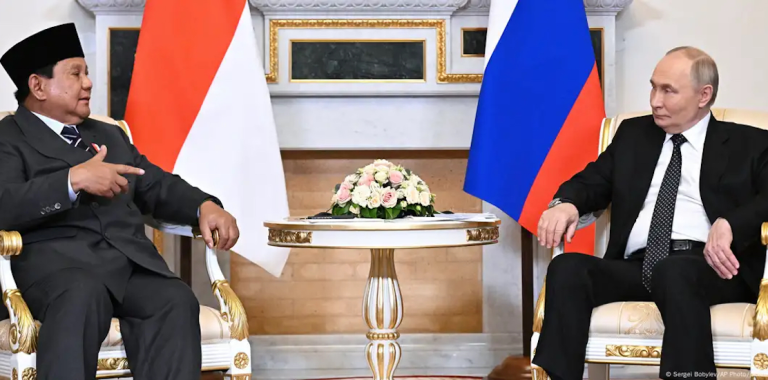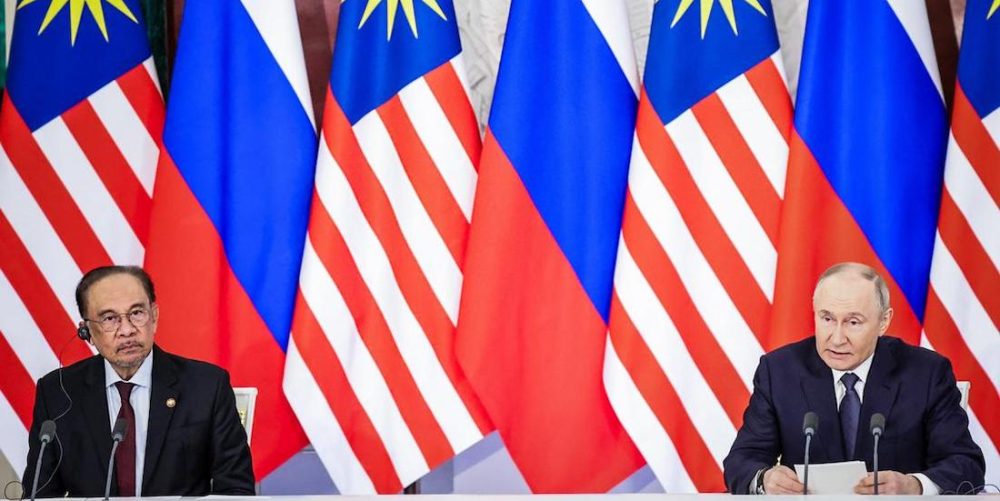
Deutsche Welle report that Malaysia and Indonesia are pursuing deeper partnerships with Moscow amid ‘evolving global dynamics.‘
New York, N.Y. – As geopolitical tensions reshape international alliances, two major Southeast Asian nations are significantly deepening their relationships with Russia, challenging traditional Western-aligned partnerships, and embracing a more independent foreign policy approach that prioritizes strategic autonomy over traditional alliance structures.

Strategic Partnerships Take Shape
Indonesian President Prabowo Subianto made headlines last month when he skipped a G7 summit to visit Russia, where he and Vladimir Putin agreed that bilateral ties are “getting stronger again.” The Indonesian leader’s office stated that “My meeting with President Putin today was intense, warm and productive. In all fields of economics, technical cooperation, trade, investment, and agriculture, they all have experienced significant improvements.”
Standing alongside Putin in St. Petersburg, Prabowo declared that Indonesia would not follow the philosophies of “the biggest and most powerful power in the world” and described Russia and China as without “double standards” and as defenders of “the downtrodden and the oppressed.” This rhetoric represents a significant shift from traditional diplomatic language used by Southeast Asian leaders when engaging with major powers.
Economic Cooperation Accelerates
The economic dimension of these partnerships has shown remarkable growth. Russia’s bilateral trade with Association of Southeast Asian Nations (ASEAN) countries grew to a record high of $22 billion in 2023, according to Russian data cited by the Lowy Institute, an Australian think tank. That represents more than 14% year-on-year growth. This growth trend is expected to continue as both nations explore new avenues for commercial cooperation.
Malaysia and Indonesia are actively exploring possible ways to expand trade, including in arms imports and energy cooperation. Energy represents a particularly important area of cooperation for Indonesia, which still heavily relies on coal as a source of power. Several Southeast Asian states have expressed interest in exporting electrical goods and machinery to Russia, which has faced crippling Western sanctions since 2022.
Technology and Nuclear Cooperation
Both nations are keen on utilizing Russian expertise to develop their civilian nuclear energy sectors. In February, ASEAN Secretary General Kao Kim Hourn opened an exhibition on ASEAN-Russia Cooperation in Civilian Nuclear Energy and Technologies at the regional bloc’s headquarters in Jakarta, demonstrating the institutional support for these partnerships.
The financial commitment to these relationships is substantial. In St. Petersburg last month, Indonesia’s sovereign wealth fund, Danatara, and the Russian Direct Investment Fund signed an agreement to create an investment fund worth €2 billion, marking a significant milestone in economic cooperation between the two nations.
Alternative International Forums
While several Southeast Asian countries are looking to join multilateral organizations, many have looked to the BRICS (Brazil, Russia, India, China, South Africa) grouping as an alternative arena for global politics.

Indonesia is now a formal member of BRICS, while Malaysia, Thailand, and Vietnam are partner countries.
As Ian Storey, senior fellow at Singapore’s ISEAS-Yusof Ishak Institute and author of “Putin’s Russia and Southeast Asia,” explained, Prabowo and Anwar “are keen to strengthen their countries’ non-alignment by pursuing a more balanced foreign policy, including closer ties with both Russia and China.”
Shifting Geopolitical Calculations
The timing of these diplomatic overtures is significant. Although Malaysia and Indonesia did initially condemn Russia’s invasion of Ukraine in early 2022, they have typically taken a neutral position on the ongoing war.
Beginning early 2024, their public statements have become noticeably more pro-Moscow.
During his trip to Vladivostok in September last year, Malaysian Prime Minister Anwar Ibrahim praised Putin for his “vision and leadership” and for his “determination…to survive,” presumably referring to Western sanctions. He also championed Moscow for its “remarkable soft power” that has earned it “global respect and admiration, influencing the hearts and minds of people around the world.”
Domestic Political Considerations
The shift toward Russia also reflects domestic political calculations. As Bridget Welsh, an honorary research associate at the University of Nottingham‘s Asia Research Institute Malaysia, noted, Russian engagement is “popular at home due to anti-westernism, with many Malaysians believing that the U.S. provoked the Ukraine War.”
This year’s State of Southeast Asia Survey found that anti-Western feeling is riding high in Muslim-majority Indonesia and Malaysia, in large measure due to the West’s support for Israel in its Middle Eastern wars.
Future Implications
Zachary Abuza, a professor at the National War College in Washington, suggested that Russia provides an “interesting model” for Indonesia and Malaysia as a country “that can act independently, poke America and the West in the eye, and try to establish a new international order.”
However, questions remain about the extent to which these nations are engaging with Russia out of geopolitical necessity versus genuine alignment with Moscow’s worldview. When asked why he turned down a G7 invitation to visit Russia instead, Prabowo replied, “Don’t read too much into it …We want to be friends with everybody.”
The strengthening ties between Malaysia, Indonesia, and Russia represent a significant shift in regional geopolitics, challenging traditional assumptions about alignment and demonstrating the growing confidence of ASEAN nations in pursuing independent foreign policies that prioritize strategic autonomy over traditional alliance structures.